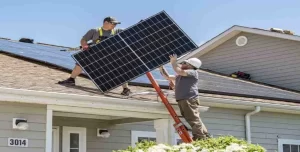Solar installations present both opportunities and risks. Selecting the right solar panels is essential in mitigating potential issues. Certified panels stand out due to their rigorous testing and adherence to industry standards, promising reliability. In contrast, non-certified panels, though initially less expensive, may introduce unforeseen complications. This raises important questions about long-term investments and overall performance. When comparing certified solar vs non certified options, it’s clear that the choice can greatly impact energy efficiency and maintenance. What other factors should be considered when making this essential decision?
Key Takeaways
- Choose certified solar panels to ensure reliability and compliance with industry standards, minimizing risks of equipment failure and maintenance costs.
- Prioritize installation by certified professionals to enhance system performance and longevity, reducing potential safety issues and inefficiencies.
- Evaluate efficiency ratings and warranties of solar panels, as certified options typically offer better long-term performance and manufacturer confidence.
- Perform site assessments to optimize panel placement, maximizing energy production and minimizing risks associated with improper installation.
- Regular maintenance and monitoring are essential to sustain system performance, particularly for non-certified panels which may require more frequent attention.
Understanding the Risks of Solar Installation
When considering solar installation, it is essential to understand the inherent risks involved, as these can greatly impact both performance and safety. Homeowners face potential issues such as equipment failure, improper installation, and lack of compliance with local regulations. These risks can lead to decreased energy efficiency and increased maintenance costs. Additionally, non-certified panels may pose greater hazards, as they often lack the rigorous testing and quality assurance that certified panels undergo. Understanding these risks empowers consumers to make informed decisions, fostering a sense of community among those who prioritize safety and performance in their solar investments. Ultimately, choosing certified solar versus non-certified options can greatly enhance the reliability and longevity of solar systems, ensuring a safer changeover to renewable energy.
The Importance of Certified Solar Panels
The significance of certified solar panels cannot be overstated, especially in the context of the risks associated with solar installation. Certified panels undergo rigorous testing and meet specific industry standards, ensuring their reliability and efficiency. This certification process offers assurance to consumers, reducing the potential for future maintenance costs and system failures. In addition, certified solar panels often come with better warranties, providing peace of mind for those investing in renewable energy. By choosing certified solar panels, homeowners align themselves with reputable manufacturers, fostering a sense of belonging to a community committed to sustainable practices. Ultimately, the choice between certified solar vs non-certified panels impacts not only individual households but also the broader mission of advancing clean energy solutions.
Comparing Certified Solar Vs Non-Certified Panels
How can homeowners make an informed decision regarding their solar panel investment? When comparing certified solar vs non-certified panels, it is essential to evaluate performance, warranty, and safety standards. Certified panels undergo rigorous testing, ensuring they meet industry benchmarks for efficiency and durability. This certification often translates to longer warranties and better customer support, fostering peace of mind for homeowners. Conversely, non-certified panels may appear attractive due to lower initial costs, but they often lack transparency regarding their reliability and safety. Homeowners should weigh the long-term benefits of certified options against the potential risks associated with non-certified alternatives. Ultimately, investing in certified solar panels not only enhances energy production but also contributes to a more sustainable and secure home environment.
Key Factors to Consider When Choosing Solar Panels
What critical elements should homeowners assess before selecting solar panels? Understanding the differences between certified solar vs non-certified options is vital. Homeowners should prioritize several key factors to guarantee a wise investment in solar technology.
- Efficiency Ratings: Higher efficiency rates translate to more energy production, making this a vital consideration.
- Warranty and Longevity: A robust warranty can indicate the manufacturer’s confidence in their product, offering protection against potential defects.
- Installation Quality: The expertise of the installation team can greatly impact the system’s performance and lifespan, emphasizing the need for certified professionals.
Best Practices for Ensuring Successful Solar Installations
Selecting the right solar panels is only the beginning of a successful solar installation. To guarantee peak performance, engaging certified solar installers is essential. These professionals are equipped with the knowledge and experience to navigate complexities that arise during installation. Conducting a site assessment is also crucial, as it identifies the best orientation and angle for solar panels, maximizing energy capture. Regular maintenance and monitoring of the system further enhance longevity and efficiency. Additionally, investing in certified solar panels, as opposed to non-certified options, greatly reduces risks associated with performance and warranty claims. Adhering to these best practices fosters a sense of community and confidence among solar users, reinforcing the collective commitment to sustainable energy solutions.
Frequently Asked Questions
What Are the Warranties Offered for Certified Solar Panels?
Certified solar panels typically offer extensive warranties, often ranging from 25 to 30 years. These warranties protect against defects and performance degradation, providing consumers with peace of mind and assurance regarding their investment in renewable energy.
How Do Installation Costs Differ Between Certified and Non-Certified Panels?
Installation costs for certified solar panels typically exceed those of non-certified options due to higher quality standards and warranties. However, the long-term savings and reliability of certified systems often justify the initial investment, fostering peace of mind.
Can Non-Certified Panels Still Be Efficient in Energy Production?
Non-certified panels can exhibit varying energy production efficiency, often influenced by manufacturing quality and technology. While some may perform adequately, potential risks and inconsistencies urge consumers to evaluate certified solar options for reliable long-term performance.
What Maintenance Is Required for Certified Solar Panels?
Maintenance for certified solar panels typically includes regular cleaning, inspection for damage, and monitoring performance. Such proactive care guarantees peak efficiency, longevity, and reliability, ultimately fostering a sense of community among environmentally-conscious users.
Are There Financial Incentives for Using Certified Solar Panels?
Financial incentives often favor certified solar panels, as many governments and organizations offer tax credits, rebates, and grants. These benefits encourage adoption, enhancing both environmental impact and economic viability for homeowners and businesses alike.
Conclusion
To summarize, prioritizing certified solar panels is essential for mitigating risks associated with solar installations. The rigorous testing and adherence to industry standards guarantee reliability, energy efficiency, and lower maintenance costs. While non-certified panels may present a tempting initial cost advantage, the potential for equipment failure and lack of transparency can lead to greater long-term expenses. By choosing certified panels and installers, consumers can protect their investments and enhance the sustainability of their energy solutions.
You May Also Like To Read:


